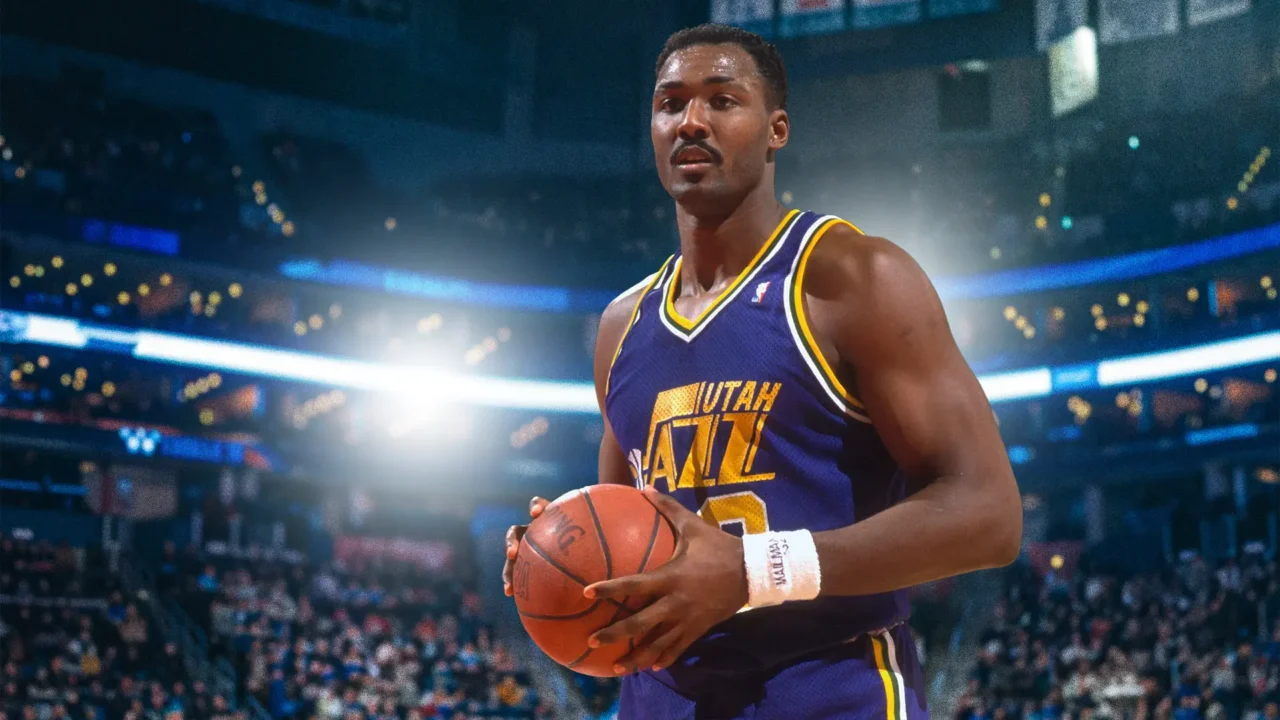Who is Karl Malone?
Karl Malone, famously known as “The Mailman,” left an indelible mark on NBA history with his scoring dominance, relentless work ethic, and iconic partnership with John Stockton. Despite his lack of a championship, Malone’s career stands as one of the greatest in basketball history.
3 Minute Read

Early Life and College Career
Karl Anthony Malone was born on July 24, 1963, in Summerfield, Louisiana. Growing up in a small rural town, Malone developed a strong work ethic while helping his family on their farm. Basketball quickly became his passion, and his talent earned him a scholarship to Louisiana Tech University.
At Louisiana Tech, Malone transformed the team into a powerhouse. By his junior year, he led the Bulldogs to their first-ever NCAA Tournament appearance in 1984. His physicality and scoring ability made him a standout player, and he declared for the NBA Draft after his junior season.
NBA Beginnings and the Jazz Connection
The Utah Jazz selected Malone with the 13th overall pick in the 1985 NBA Draft. Teaming up with point guard John Stockton, Malone quickly became one of the most dominant power forwards in the league. Their pick-and-roll offense became legendary, terrorizing defenses for nearly two decades.
In his rookie season, Malone averaged 14.9 points and 8.9 rebounds per game, earning a spot on the All-Rookie First Team. Over the next several seasons, he established himself as a force, regularly averaging over 20 points and 10 rebounds per game.
The Peak of His Career
Malone’s prime years in the late 1980s and 1990s cemented his place among the NBA’s elite. Known for his durability, Malone rarely missed games and consistently delivered dominant performances. By 1997, he earned his first NBA MVP award, averaging 27.4 points, 9.9 rebounds, and 4.5 assists per game while leading the Jazz to the NBA Finals.
In 1999, Malone captured his second MVP award, becoming one of only 13 players in league history to win multiple MVPs. His scoring ability, rebounding prowess, and leadership kept the Jazz as perennial contenders in the Western Conference.
Finals Heartbreak
Despite his personal success, Malone’s career is often defined by near-misses in the NBA Finals:
- 1997 NBA Finals: Malone and the Jazz faced Michael Jordan’s Chicago Bulls. Malone averaged 23.8 points and 10.3 rebounds in the series, but the Jazz fell in six games, with Jordan’s clutch performances sealing their fate.
- 1998 NBA Finals: In a rematch against the Bulls, Malone improved his numbers to 25 points and 10.5 rebounds per game. However, Jordan’s iconic game-winning shot in Game 6 denied Malone and the Jazz once again.
- 2004 NBA Finals: In the twilight of his career, Malone joined the Los Angeles Lakers in pursuit of a championship. Despite forming a superteam with Shaquille O’Neal, Kobe Bryant, and Gary Payton, the Lakers lost to the Detroit Pistons in five games.
Career Stats and Achievements
- Points per Game (PPG): 25.0
- Rebounds per Game (RPG): 10.1
- Assists per Game (APG): 3.6
- Steals per Game (SPG): 1.4
- Blocks per Game (BPG): 0.8
- Player Efficiency Rating (PER): 23.9
- Win Shares (WS): 234.6
- Value Over Replacement Player (VORP): 104.3
Notable accolades include:
- 2 MVP Awards (1997, 1999)
- 14 All-Star Selections
- 11 All-NBA First Team Selections
- 3 NBA All-Defensive First Team Selections
- Member of the NBA 50th and 75th Anniversary Teams
- Naismith Memorial Basketball Hall of Fame Inductee (2010)
Malone is also the third all-time leading scorer in NBA history, with 36,928 points.
Legacy
Karl Malone’s career is a testament to consistency and dominance. Known for his unmatched scoring ability as a power forward, his partnership with John Stockton remains one of the most iconic duos in NBA history. Despite falling short of a championship, Malone’s legacy is defined by his relentless drive, durability, and excellence on the court.
Whether delivering powerful dunks or clutch baskets, Karl Malone’s contributions to the game have solidified his place among the greatest players in basketball history. His work ethic and passion continue to inspire players and fans alike.


